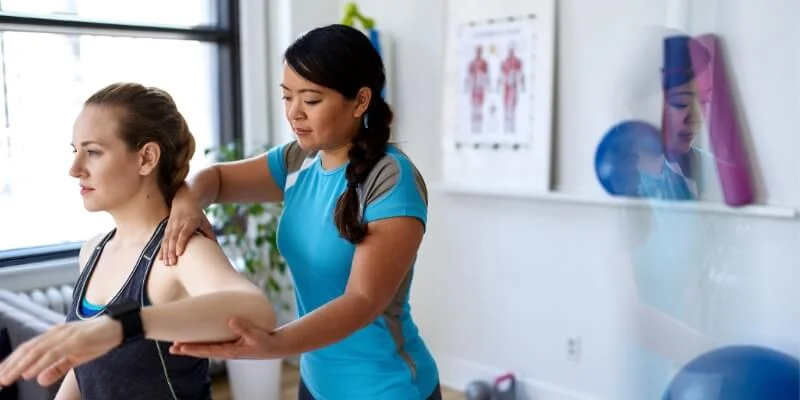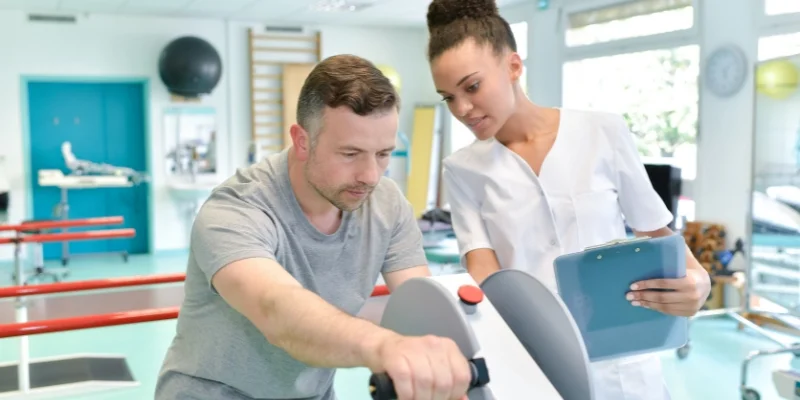In the dynamic realm of modern workplaces, the well-being of employees takes centre stage. It’s a well-recognised fact that a healthy and happy workforce is not just a moral obligation but a key driver of productivity and success.
However, in the journey towards a thriving workplace, occasional bumps can occur in the form of injuries, illnesses, or health conditions. That’s where occupational rehabilitation steps in, serving as the bridge that connects individuals to their work, their health, and their ultimate well-being.
In this blog post, we delve into the vital world of occupational rehabilitation, shedding light on its significance, impact, and the role it plays in creating safer, more productive work environments.
We’ll explore how it contributes to injury prevention, its benefits for both employees and employers, the key steps involved in the rehabilitation process, and real-world success stories that inspire and exemplify its potential.
What is Occupational Rehabilitation?
Occupational rehabilitation is a specialised field that plays a pivotal role in the recovery and reintegration of individuals into the workforce following an injury, illness, or medical condition.
It encompasses a range of interventions and support systems designed to assist people in regaining their physical and psychological well-being, enabling them to return to work and lead fulfilling lives.
Occupational rehab programs are customised to address the unique needs of each individual. Whether someone has experienced a workplace injury, a chronic health condition, or a significant medical event, the goal is the same: to facilitate a safe, effective, and sustainable return to work.
This is exactly what we offer for you at Core Healthcare. No two injuries are the same, just as no two bodies are the same. Our physiotherapists have specific experience in occupational medicine and are well-versed in tailoring each and every program to suit the unique needs of their clients.
How Occupational Rehabilitation Plays a Key Role in Workplace Injury Prevention
Preventing workplace injuries is a shared responsibility. Employers, employees, and healthcare professionals all play integral roles in creating a safe and injury-free work environment. Occupational rehabilitation, in particular, acts as a linchpin in the chain of injury prevention.
By focusing on early intervention, timely treatment, and a comprehensive approach to rehabilitation, occupational rehabilitation programs help reduce the severity and duration of injuries. They also address any underlying factors that may contribute to injuries in the first place.
Through tailored strategies, education, and personalised support, these programs foster a culture of safety, awareness, and well-being in the workplace.
Benefits of Occupational Rehabilitation Programs for Employees and Employers
You probably know that occupational rehabilitation is beneficial for those who need it (well, obviously!). Did you know that it can also benefit the workplace at large? Occupational rehab is a win-win for both employees and employers – here’s why:
- Employees benefit from personalised care and support, including access to healthcare professionals who specialise in their specific condition. This results in faster recovery, reduced time away from work, and a smoother transition back to the job.
- For employers, occupational rehabilitation programs translate into reduced absenteeism and workers’ compensation costs. By promoting a safe and supportive work environment, these programs contribute to improved employee morale and productivity.
Employers who invest in the well-being of their workforce not only fulfill their ethical duty but also enhance the overall success of their organisation.
The Key Steps in an Effective Occupational Rehabilitation Process
The effectiveness of occupational rehabilitation hinges on a structured and individualised approach. At Core Healthcare, our process typically involves:
- Assessment: A comprehensive evaluation of the employee’s physical and psychological health, work-related tasks, and the workplace itself.
- Goal setting: Collaborative goal-setting that aligns with the employee’s and employer’s needs, ensuring a clear path to recovery and return to work.
- Intervention: Implementing tailored strategies, which may include physical therapy, psychological support, pain management, and skill development, depending on the individual’s needs.
- Monitoring and adjustment: Continuous assessment and adaptation of the rehabilitation plan to ensure progress and address any challenges or setbacks.
- Return to work: Gradual reintroduction into the workplace, considering any necessary accommodations, with ongoing support to maintain well-being and productivity.
Following these steps ensures a safe recovery and a successful return to work. Oftentimes we see people going back to work prematurely – while it can be tempting given everyone’s busy lives and heavy workloads, it’s imperative to ensure you’re fully checked out by your Physiotherapist to avoid further injuries prior to returning to work.

Success Stories: Real-world Examples of Occupational Rehabilitation
Real-world success stories exemplify the positive impact of occupational rehabilitation. These stories highlight individuals from a range of industries who, with the support of tailored rehabilitation programs, overcame challenges, regained their health, and successfully returned to work.
Agriculture Industry: Shane’s Story
Shane, a Sugar Cane Farmer with 14 years of experience, had faced two previous lower back injuries. After four months of unresolved lumbar spine pain, a spinal specialist referred him to Core Healthcare Group for a pre-operative back strengthening program. Initially, the specialist believed surgery was the only option, and Shane was told he couldn’t return to farming.
Our assessment revealed Shane’s past treatments lacked active rehabilitation tools, focusing mainly on pain relief rather than lumbar spine functional restoration. However, after two weeks in Core’s program, Shane’s perspective shifted, and he no longer believed surgery was inevitable.
Construction Industry: Paul’s Story
Paul, a construction industry veteran, developed lower back tightness – a common complaint among construction workers. This led to his diagnosis of lumbar spine degenerative disc disease and a 3-month work incapacitation.
Referred to us by his spinal specialist, he initially had reservations about his prognosis. Engaging in a Graded Rehabilitation Program, including clinical treatment and a home exercise regimen, Paul’s condition improved, progressing to hydrotherapy and a gym program for work reentry preparation.
Unfortunately, due to his employer’s contract loss, Paul faced redundancy. The Worker’s Compensation insurer referred him to Core for Transferable Skills Assessment. Identified computer proficiency led to Paul’s fitness certification and placement in an administrative role at a local Private Hospital.
Ongoing participation in his rehabilitation program upgraded his postural and seated tolerances, ultimately securing a permanent position as an Admissions Clerk at the hospital.
Retail Industry: Jenny’s Story
Jenny sustained a neck injury over time due to her work as a Regional Manager at a national clothing retailer. Initially, she was deemed fit for suitable duties, but her condition worsened, leading to total incapacitation for three months.
Specialist consultation revealed mild degenerative disc disease and Peripheral Nerve Entrapment Syndrome. She joined Core’s Pain Management and Occupational Rehabilitation Program, completing it successfully. This led to a Workplace Assessment and a phased return to work with modified hours.
Ergonomic adjustments were made, ensuring Jenny’s comfort and safety during her shifts. A tailored gym program, postural re-education, and Clinical Pilates sessions further improved her physical and functional capabilities. After eight weeks, Jenny successfully returned to full-time work with no ongoing symptoms.

Start Occupational Physiotherapy With Us Today
The importance of occupational rehabilitation can’t be overstated, as it lies at the heart of a robust, resilient workforce. We understand how disheartening it can feel to sustain an injury at work, and further, to be unable to work due to that injury. It can be a painful experience, but not one without pathways to recovery and success.
If you’re seeking a supportive, effective, and personalised approach to occupational rehab, get in touch with us. Our dedicated team of professionals is committed to empowering individuals to reclaim their health and re-enter the workforce with confidence.
Embrace the journey of recovery and well-being. Book your consultation with Core Healthcare today and take the first step towards a safer, healthier, and more productive workplace.

